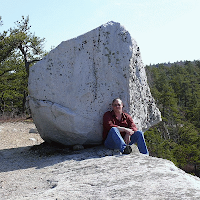What am I teaching? Well, today I'll feature some of the online courses and tomorrow the in-person classes. I'm biased, of course, but I think they're great classes and really looking forward to teaching them (and it's even better when there are interested and engaged students taking them).
These fully online courses are available through the State University of New York (SUNY) Learning Network and can be taken from anywhere in the world that you have a reliable Internet connection. While your register with my college, you don't have to be a student there to take the class.
In what we call Summer Session 2, from July 5 to August 15, I'm teaching ESC-114-S16 Geology of the National Parks - a course I developed a few years back specifically for the online environment. Here's a description:
Designed for the non-science major, this course provides an introduction to geology and the geological evolution of North America through a detailed examination of selected U.S. National Parks and Monuments. National Parks studied include the Grand Canyon, Zion, Canyonlands, Petrified Forest, Badlands, Mammoth Cave, Carlsbad Caverns, Acadia, Yosemite, Mt. Rainier, Crater Lake, Hawaii Volcanoes, Yellowstone, and Death Valley among others. In addition to learning about the geology of North America’s National Parks, students will also gain an appreciation for the scenic beauty, natural resources, flora, and fauna preserved in these unique areas.
If you're a student at a SUNY school, this course satisfies a Natural Science General Education Elective and we have both science and non-science majors taking the course (there are no prerequisites). I've personally visited many of the national parks and monuments around the U.S. including Acadia, Grand Canyon, Yosemite, Yellowstone, Rainier, Crater Lake, Death Valley, Canyonlands, Arches, Badlands, and others (I'll also be visiting Mammoth Cave in July). Taking this course will not only teach you about geology and the geologic history of North America, but greatly enhance your enjoyment of any national park you visit in the future since I like to discuss more than just geology - we'll also touch on history (including the Native Americans), flora, and fauna.
In the fall semester, from August 24 to December 26, I'm teaching AST-105-S01 Ancient Astronomy - another course I originally developed and which first ran last fall (successfully, I might add). Here's the course description:
 This online course will examine the earliest origins of astronomy, our oldest science. The first half of the course will introduce students to the night sky. Topics covered will include the movements of the Earth and other solar system objects; the phases and cycles of the Moon; the origin of seasons, solstices, equinoxes, and eclipses; constellations and celestial navigation; and how ancient astronomers used their observations in developing civilization’s earliest calendars.
This online course will examine the earliest origins of astronomy, our oldest science. The first half of the course will introduce students to the night sky. Topics covered will include the movements of the Earth and other solar system objects; the phases and cycles of the Moon; the origin of seasons, solstices, equinoxes, and eclipses; constellations and celestial navigation; and how ancient astronomers used their observations in developing civilization’s earliest calendars.The second half of the course will be a broad survey of the historical development of astronomy from ancient times up to the scientific revolution of the Renaissance Period. Cosmologies from representative cultures around the world will be examined along with significant archaeoastronomy sites including the Egyptian pyramids, Stonehenge, Newgrange, Chichen Itza, Machu Picchu, Chaco Canyon, the Big Horn Medicine Wheel, and others.
There are no prerequisites for this course other than being at a college level. If you are a student that requires remedial math and/or English courses, this class would be a challenge (don't be scared off, the BIGGEST predictor of student success is a genuine interest in the topic!). If you've ever wondered how the phases of the Moon work, how ancient people knew about solistices and equinoxes, what we really know about Stonehenge, or how the Mayan calendar is all about, this course is for you! I'll also introduce you to a cool (and free) planetarium program that will show you what's in the night sky at any time or place) and ask you to go outside occassionally and look up to get in tune with the sky and how it changes.
How can you find out more about these courses? Email me with any content questions (there's a link in the left sidebar of my blog). For questions about how to register for these SUNY Learning Network online courses, or what the tuition and fees will be, contact the Registrar's Office at SUNY Ulster County Community College.




Totally there. In a cyberspace way.
ReplyDelete